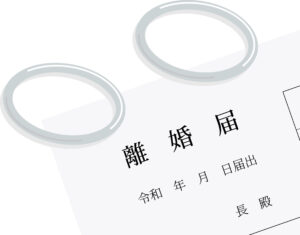If one party of a married couple is a Japanese national living in Japan, divorce can be done in accordance with Japanese law. There are three main types of divorce in Japan: Divorce by Mutual Consent(協議離婚 Kyōgi Rikon), Divorce by Mediation(調停離婚 Chōtei Rikon), and Divorce by Lawsuit(裁判離婚 Saiban Rikon).
What is Divorce by Mutual Consent (協議離婚 Kyōgi Rikon)?
If a couple is in agreement on the conditions of their divorce, they often opt for Divorce by Mutual Consent in order to avoid time-consuming mediation or lawsuit. The procedure for a Divorce by Mutual Consent is simply to fill out a divorce form (離婚届 Rikon Todoke) and submit it to the city office.

However, since Divorce by Mutual Consent is a process without the involvement of the court, in some countries, it may not be recognized as a valid divorce. In such cases, Divorce by Mediation or Divorce by Lawsuit should be considered even if they agree to all conditions of their divorce.
What is Divorce by Mediation(調停離婚Chōtei Rikon)?
If the parties are unable to agree on the conditions of divorce or divorce itself, the parties need to go through the process of Divorce by Mediation.
Mediation is a system in which the parties attend local family court and, with the involvement of a mediator, attempt to reach a voluntary resolution through discussion. In the process of Divorce by Mediation, parties can decide various matters such as custody, child support, alimony, and division of property.
If mediation is not successful but the family court considers that the case should be concluded, the family court can present a solution. This is called a trial in lieu of mediation(調停に代わる審判 Chōtei ni Kawaru Shinpan). However, the parties may file an objection in writing within two weeks from the date of the notice of the trial in lieu of mediation. If a party files a legitimate objection to the trial, the trial ceases to be effective. On the other hand, if no objection is filed, the trial will become effective and final.
What is Divorce by Lawsuit (裁判離婚 Saiban Rikon)?
If the parties cannot agree on the conditions of divorce or divorce itself through mediation, they may file a lawsuit for divorce. The parties cannot just file a lawsuit without first going through mediation.
In lawsuit, each party needs to prove their claim by evidence. And if the other party is opposed to divorce, a divorce ruling can be obtained only if one of the following five reasons is found:
- The other party has committed infidelity
- The other party has maliciously abandoned the spouse
- The other party’s life or death has been unknown for more than 3 years
- The party is suffering from severe mental illness and is not expected to recover
- There are other serious reason that make it difficult to continue the marriage.
If you are not married, you may be interested in our article about “Should Make a Prenup in Japan“?.

Effect of divorce in your home country
Divorce by Mutual Consent, Divorce by Mediation, or Divorce by Lawsuit is only effective in Japan. In order to make the divorce effective in your home country, separate procedures, such as notification and submission of a certificate to relevant authorities in your country, are required.
And as mentioned above, Divorce by Mutual Consent may not be recognized as a valid divorce in some countries. Therefore, before starting divorce proceedings in Japan, it is important to confirm the procedures and required documents with the embassy or a lawyer of your home country.
When a person with the status of residence as Spouse of Japanese divorces, the divorce must be reported to the regional immigration bureau within 14 days of the divorce. If six months have passed since the divorce, the status of residence is subject to revocation unless there is a justifiable reason. Therefore, you need to change your status of residence to another one within 6 months.
Which status of residence should you change to?
For example, the following changes may be approved.
If the duration of the marriage is long,
If more than 3 years have passed since you lived in Japan as a spouse of a Japanese national before your divorce, there is a possibility that your status can be changed to Long-Term Resident(定住者 Teijū Sha). However, the applicant is subject to examination as to whether or not he/she has sufficient assets or skills to earn a living, and whether or not he/she has fulfilled the official obligations (e.g. payment of tax, pension and health insurance).
If you have custody of a Japanese child,
If you have custody of a Japanese child after divorce, it is possible to change your status of residence to that of a Long-Term Resident even if you have not been married for 3 years. However, it is necessary that you are actually taking care of the child. In addition, whether or not the applicant has sufficient assets or skills to earn a living is also subject to examination.
If you can find a job in Japan,
For example, if you find a job as a employee of a company, you may be able to continue to live in Japan by changing your current status of residence to that for working activities such as Engineer/Specialist in Humanities/International Service Visa. However, it is necessary to fulfill the permission requirements for each status of residence, such as having sufficient educational background or work experience.

If you want to consult with English Speaking Lawyer about Divorce in Japan, we recommend Ashita no Shishi Legal Office.











